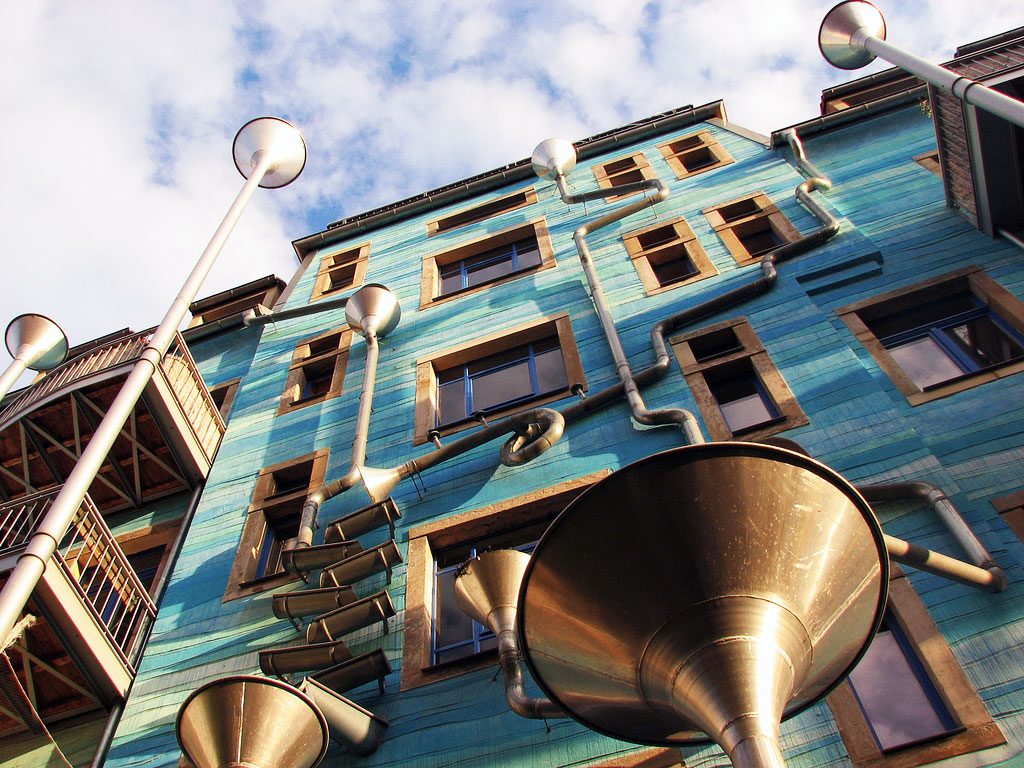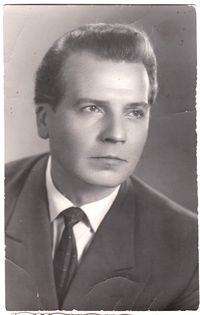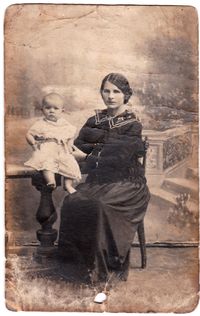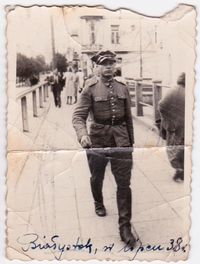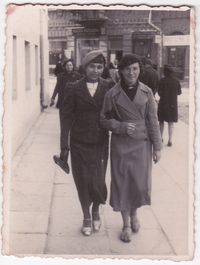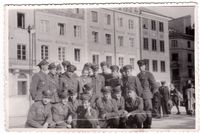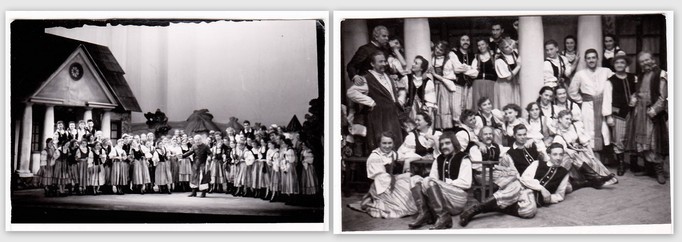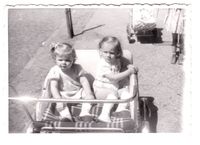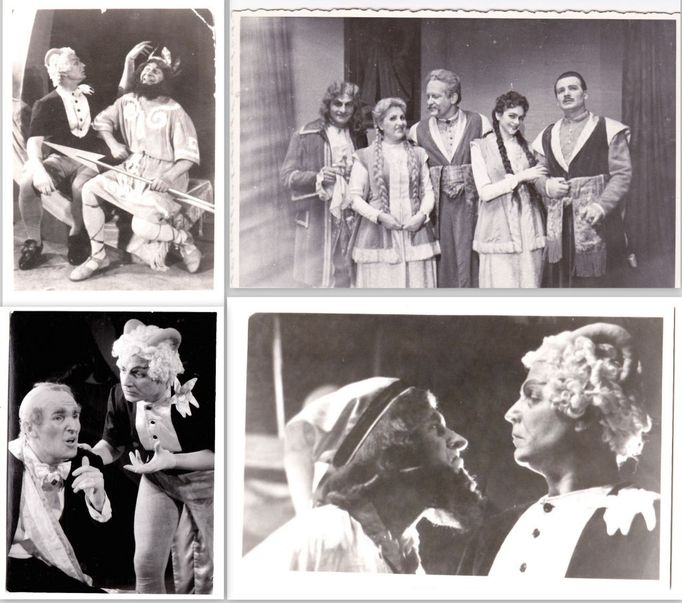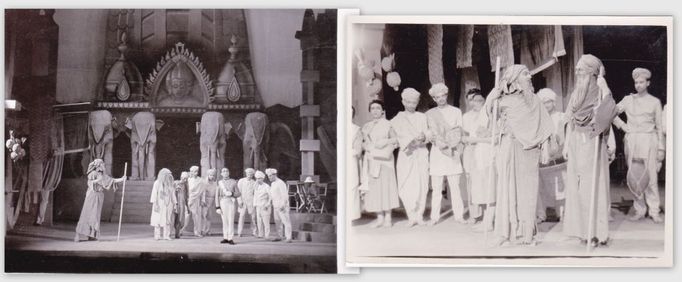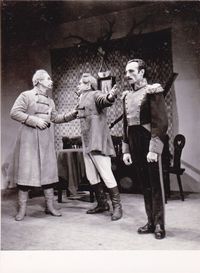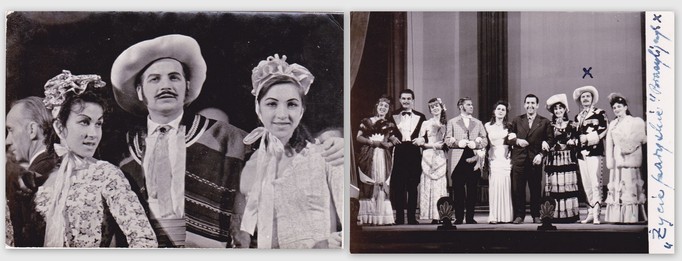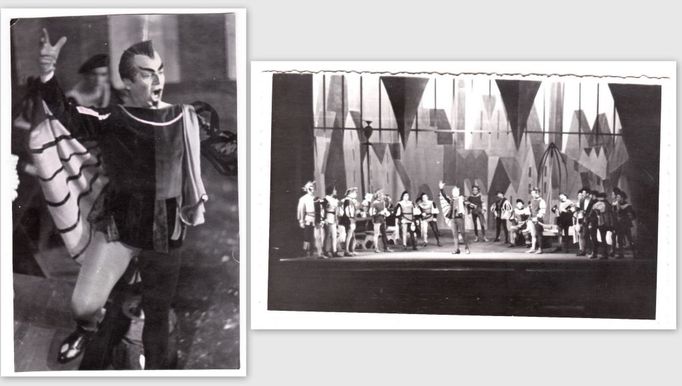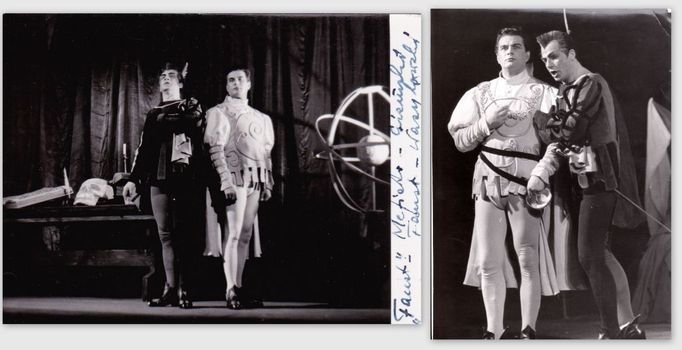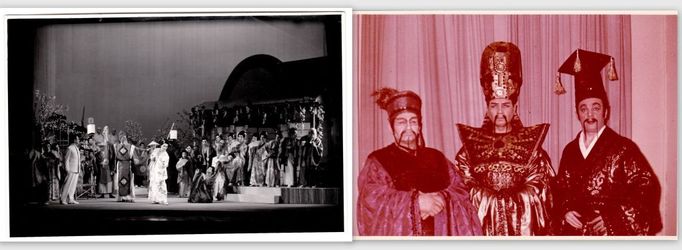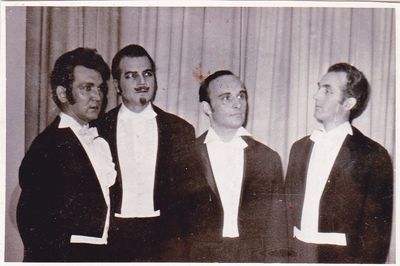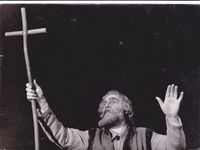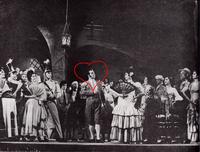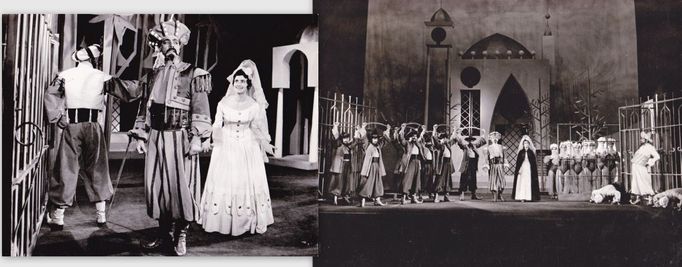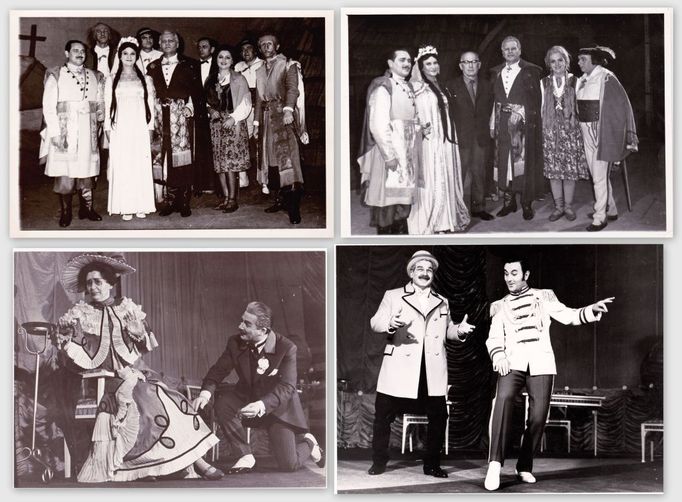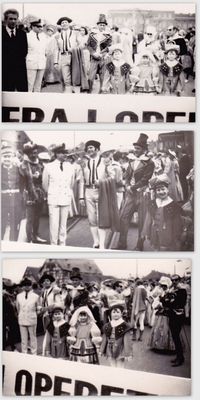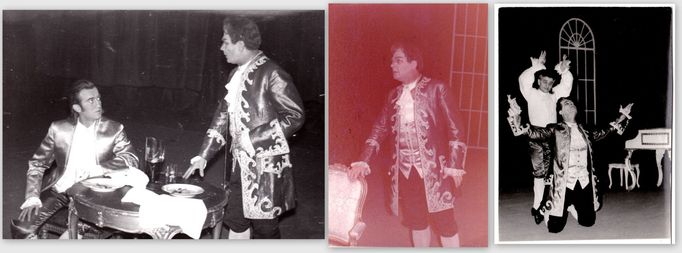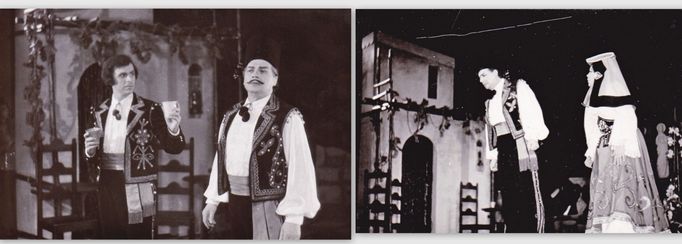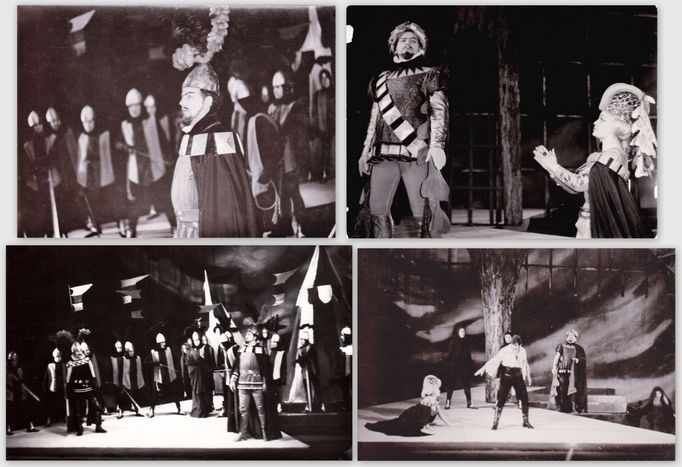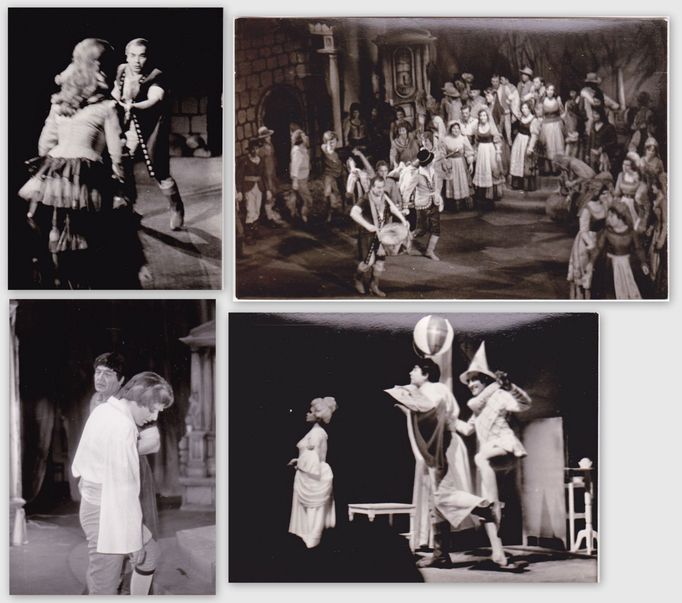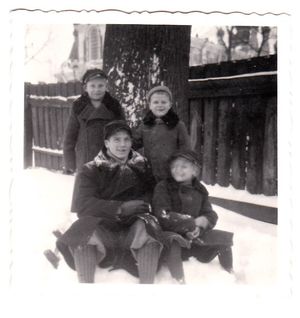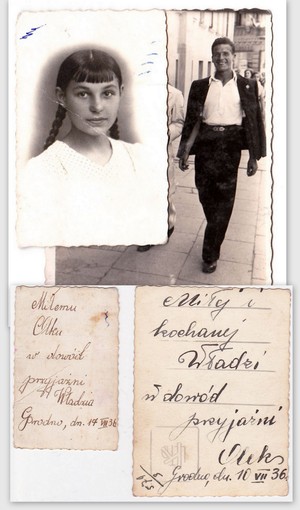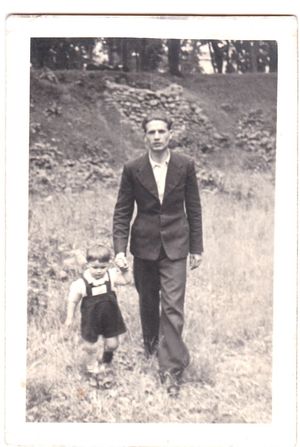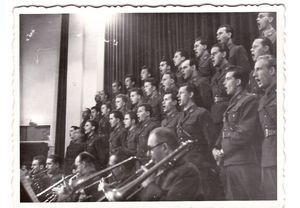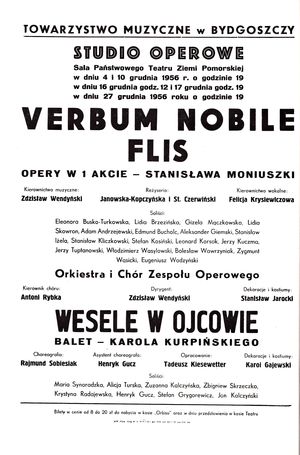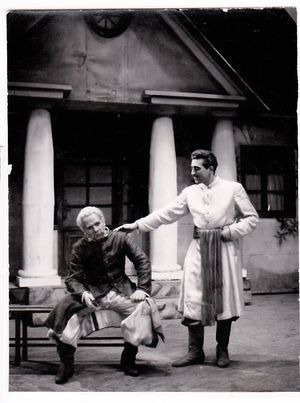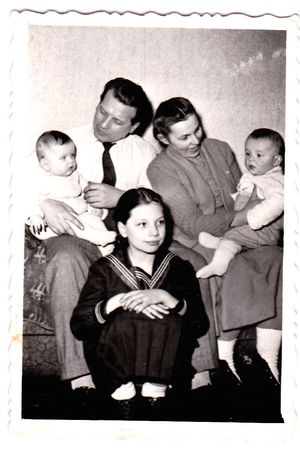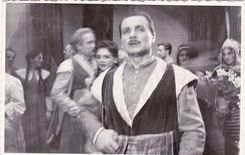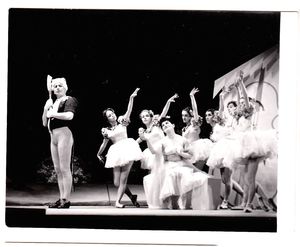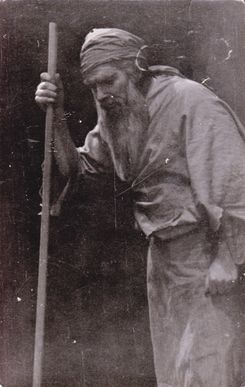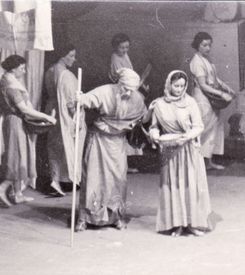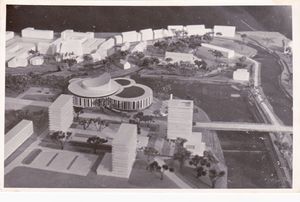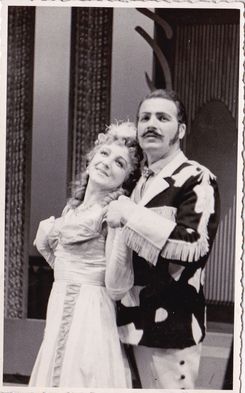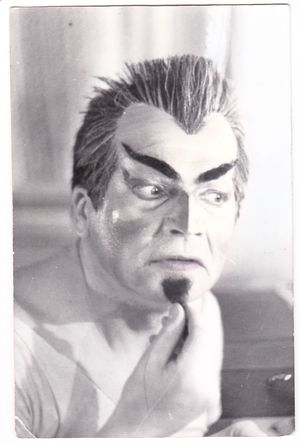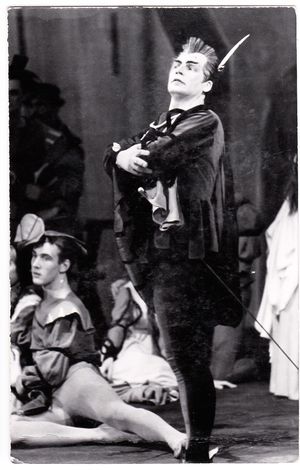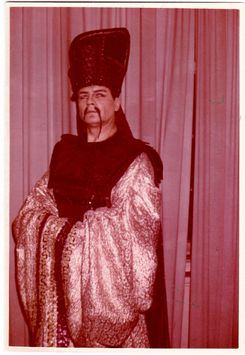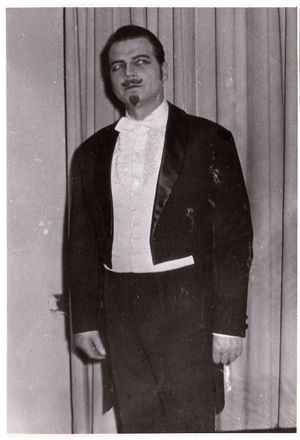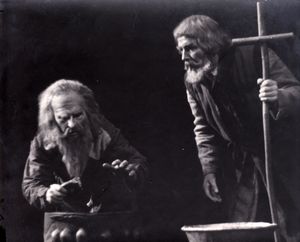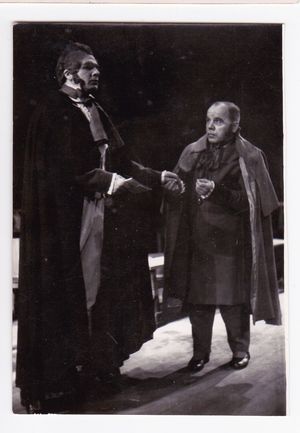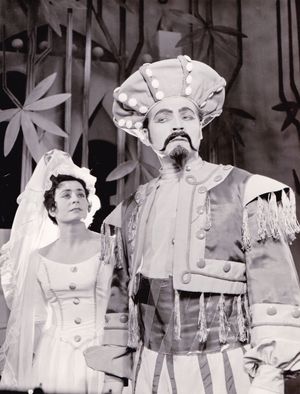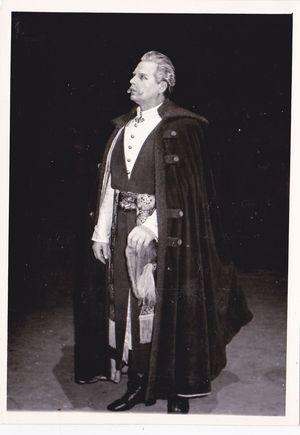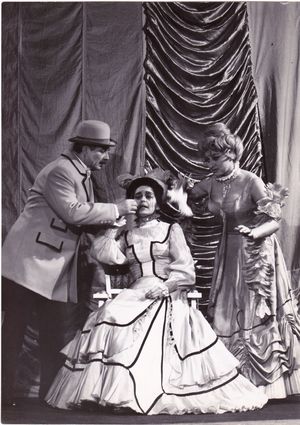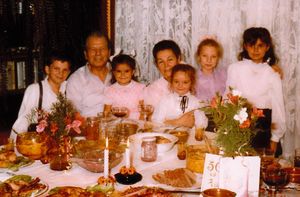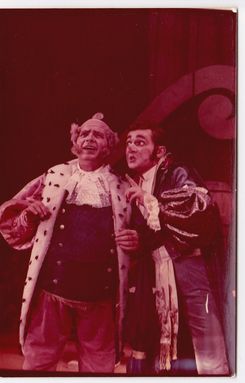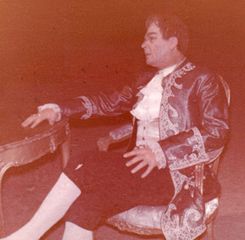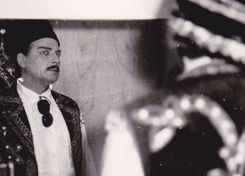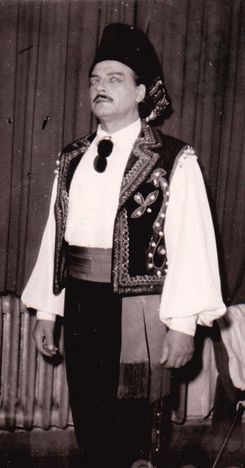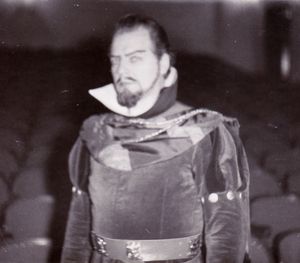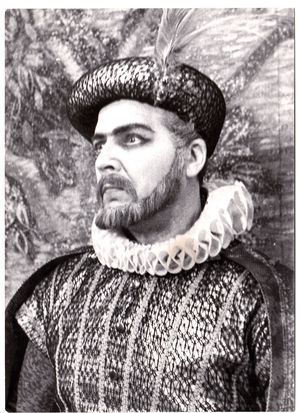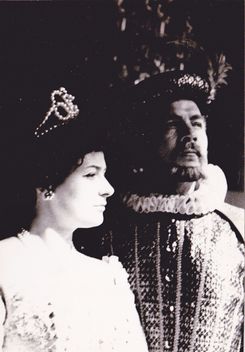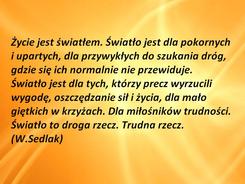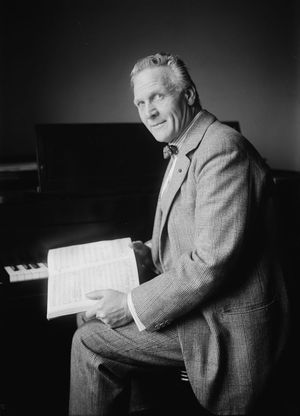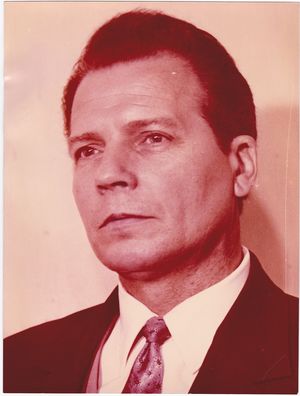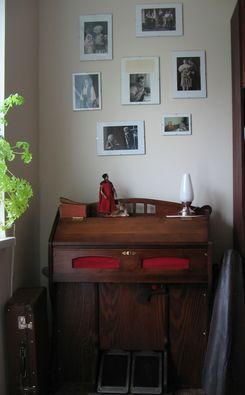Tutaj wersja polska:
One man can make a difference, and everyone should try.
John F. Kennedy
Aleksander Giemski was born on the 15th of December of 1916, in Kaluga (Russia), however he had spent his whole childhood and his youth in Grodno (Poland at that time, today's Belarus).
He was a son of an artist sculptor. Aleksander's mother, Stanislawa, nee Jurkiewicz, became a widow very early, when Aleksander was only 10 years old. Therefore, she got married again, on the 5th of May in 1925, to a Polish Army Officer, Kazimierz Chojnacki, and they had three more sons: Ignacy, Henryk and Jerzy. Unfortunately, her second husband also passed away early, before the second world war's outbreak. Stanislawa was left alone with her orphans.
Aleksander Giemski, as the oldest son and the man in the family decided to take care of his brothers and help his mother.
He had spent the years 1932-1935 studying, getting experience and diploma as a locksmith - mechanic, at Grodno highschool.
Moreover, music and theatre became his passions very early, and he partcipated in the choir and at the school theatre. This is exactly where he met his future big love and best friend for life, Wladyslawa. They promissed to each-other the vows of eternal love already in 1936. Aleksander was just 19 and Wladyslawa was only 16...
Aleksander served also in the military at that time as an uhlan, at Podlaska Brygada Kawalerii in Bialystok. All of his children and grandchildren still remember him storytelling and singing uhlan songs, at many occasions on his retirement.
After the outbreak of the WWII, on the 9th of November 1939, Aleksander got married to Wladyslawa in Grodno Parish Church, and one year later their first son, Aleksander junior was born. Even in the times of war Aleksander trained himself to secure the family, therefore he got diploma of an electrician in 1941. When the WWII ended in 1945, after the German occupation Grodno fell under the Russian occupation. Those days most of the citizens of Grodno were expelled to the western teritories under armed duress. This is how Bydgoszcz became a new home for Aleksander, his wife and his son. This is where his spirit, thirsty for development, and his passions got the chance to bloom. The future of the rest of Aleksander's and Wladyslawa's families threw them into other parts of Poland (Szczecinek, Lodz). Aleksander's mother, the widow of the officer, had to stay in Grodno.
Aleksander Giemski studied again at the Public Technology Highschool and in 1947 he gained the diploma at electrical engineering and he started to work as an engineer.
His first daughter, Halina, was born too.
The idea of bringing a music theatre to life in Bydgoszcz had sprung in 1947 as well, however because of the lack of the local authorities' approval, the development of the art culture had to wait for more favourable period. Aleksander did not give up on his passions and he developed his vocal skills, gaining another degree as an opera singer-soloist at Torun Music Institute of the Pomeranian Music Association, as well as participating at the same time in the Song and Dance Ensamble of the Pomeranian Military District, established by Jozef Szurka in 1950.
The theatre was developing without its own building, rehearsals room nor administration rooms. People were eagerly working without asking for wages or working conditions. Future opera house was being created by altruistic, passionate people who were extremely enthusiastic about arts, music and culture. The beginnings of the opera were truly hard. The team of musicians and activists of the Music Association in Bydgoszcz, with the leading roles of Felicja Krysiewiczowa, Jan Prekier, Antoni Rybka and Zdzislaw Wendynski, decided to establish an 'Opera Studio' at the meeting on the 30th of December in 1955. In January 1956 the Music Association in Bydgoszcz planned the premiere repertoire:
two 1 act operas by the Polish composer, Stanislaw Moniuszko, 'Verbum Nobile' and 'Flis', and also
a ballet show 'Cracow wedding in Ojcow' by another Polish composer, Karol Kurpinski.
Aleksander Giemski, with his bass-baritone voice timbre, was among the successful artists-soloists, chosen via casting for the team of the Opera Studio. He felt free as a bird eventually and he was able to make his dream come true.
Rehearsals and lessons were mostly taking place in private rooms and common rooms at various workplaces, and Felicja Krysiewiczowa's flat at 10 Kosciuszki Street became the rehearsals' place.
Full involvement of the Music Association allowed to collect money for the realisation of the premiere staged at the Polish Theatre in Bydgoszcz on the 21st of September in 1956. The day came when the curtains of the own opera stage went up for the first time in Bydgoszcz history.
The first, premiere role for Aleksander, was Bartlomiej in Stanislaw Moniuszko's 'Verbum Nobile'.
Verbum Nobile 1956: left (A. Giemski, soloist, Bartlomiej) right (the whole team)
Year 1957 was truly rich for his career as well as in his private life. He has staged in two premieres:
the operetta - The Gypsy Baron by Johann Strauss, A.Giemski as Count Peter Homonay, and
the opera - The Barber of Seville by Gioacchino Rossini, A.Giemski as Basil.
Two fantastic twins were born: Adam and Maria. Enlargement of the family and career success made him spread his wings.
It is worth to emphasise the support that his wife, Wladyslawa, was giving him for his whole life. Daughter, Halina, still remembers her father beiing a laggard, who would always loose his head without her mom. Wladyslawa always remembered about everything, she took care of her husband, children and for the home accountancy. Loving, caring, warm and very senstive and strong at the same time, wife, mom, daughter, sister and a friend. A wonderful grandmother at a later time.
The Opera gained momentum. It prepared two more premieres in 1958:
'Straszny Dwor' by the Polish composer Stanislaw Moniuszko (A.Giemski as Miecznik and Zbigniew), and also
'Orpheus in the Underworld' by Jacques Offenbach (A.Giemski as Pluto).
Recognition that all of the shows received enlivened discussions about the need of transforming the Opera Studio into a professional opera theatre.
Orpheus in the Underworld (top left; bottom left, right; A.Giemski as Pluto), Straszny Dwor (top right, A.Giemski as Miecznik)
Year 1959 brought two new opera premieres:
'The Tales of Hoffmann' by Jacques Offenbach (A.Giemski as Lindorf), and
'Lakme' by Leo Delibes (role of Nilakantha, a Brahmin priest).
According to one of the critics review: 'Among the soloists great recognition had been given to Aleksander Giemski who staged as a priest'.
Lakme 1959 (A.Giemski as Brahmin, left)
The management board of the Music Association in Bydgoszcz undertook dynamic actions by the end of the year 1959, which led to nationalisation of the opera studio. Simultaneously preparations for architecture planning of the opera house begun. The promoter of this idea was Andrzej Szwalbe, the chief of the Pomeranian Philharmony at that time. As a person always vigorous and entrepreneurial, Aleksander Giemski, got involved in help with these plans and organisation, and he had begun a right hand of the chief.
The sixth decade had been marked by a resolution to establish the National Music Theatre of Opera and Operetta, adopted by the National City Council in Bydgoszcz. The prepared premieres were:
Hrabina (eng. the dutchess) by the Polish composer, Stanislaw Moniuszko, (A.Giemski as Chorazy, eng. ensign),
La vie parisienne by Jacques Offenbach, (A.Giemski as the Brasilian), and
Faust by Charles Gounod, (A.Giemski as Méphistophélès).
La vie parisienne 1960 (A.Giemski as the Brasilian)
Faust 1960 (A.Giemski as Méphistophélès)
Faust 1960 (A.Giemski as Méphistophélès)
The year 1961 resulted in three premieres:
'Madama Butterfly' by Giaccomo Puccini, (A.Giemski as Bonzo),
'Halka' by the Polish composer Stanislaw Moniuszko, (A.Giemski as Stolnik and Janusz), and
'Die Fledermaus' by Johann Strauss, (A.Giemski as Dr Falke, a notary).
Madama Butterfly 1961 (A.Giemski as Bonzo)
Die Fledermaus 1961 (A.Giemski as Dr Falke, a notary)
The year 1962 was a further vigorous and ambitious transformation period - new management and new ideas. Three new premieres:
'The Inquisitive Women' by Ermanno Wolf-Ferrari,
'Widma' (eng. phantoms) by Stanislaw Moniuszko, the opera based on 'Dziady' by Adam Mickiewicz (eng. 'Forefathers' Eve' by the Polish greatest author of the romanticism period), where A. Giemski staged as Guslarz (eng. sorcerer); and
'Eugene Onegin' by Pyotr Ilyich Tchaikovsky, (A.Giemski as Prince Gremin).
The critics were writing about Aleksander Giemski:
'Aleksander Giemski was leading and standing out in acting, singing and recitation as a sorcerer at the premiere of 'Widma''.
In 1963 the opera already had its own opera orchestra, independent from the Pomeranian Philharmonic. Two further premieres were developed:
'Krol Wichrow' (eng. king of gales) by the Polish composer Feliks Nowowiejski, and 'Beggar Student' by Carl Milloker.
The 1964 was an another mile stone in the history of Bydgoszcz opera stage: it has received the name of The Opera and Operetta in Bydgoszcz. This time the names of the great composers triumphed: Mozart, Bizet and Verdi. Three premieres of the operas were staged:
'Il Seraglio' by Wolfgang Amadeus Mozart, (A.Giemski as Osmin, overseer for the Pasha and Bassa Selim, the Pasha),
'Carmen' by George Bizet, (A.Giemski as Escamillo and Zunig), and
'La traviata' by Giuseppe Verdi, (A.Giemski as Dottore Grenvil).
'Aleksander Giemski as Bassa Selim, the Pasha was full of vigour and his vocal without any objection'.
'Il Seraglio' 1964 (A.Giemski as Bassa Selim, the Pasha)
The following year's, 1965, fruits were
the operetta by Jean Gilbert, Die keusche Susanne (Chaste Susanne), (A.Giemski as Baron Conrad von Felseneck),
and a new rendition of 'Halka' by Stanislaw Moniuszko.
top: Halka (A.Giemski as Stolnik); bottom: Die keusche Susanne (A.Giemski as Baron Conrad von Felseneck)
The Xth anniversary of the Opera and Operetta in Bydgoszcz was celebrated with a grand festive in the city and the passage of the whole opera and operetta team through the streets of Bydgoszcz. New repertoire included:
Tosca by Giaccomo Puccini, (A.Giemski as Baron Scarpia), and
the operetta, 'The Merry Widow' by Franz Lehar.
Aleksander Giemski studied music scores at home with the accompaniment his own pump organ. The daughter, Halina, recalls that thanks to her father she had learnt by heart the whole role of Halka. Grandchildren also remember when being kids their grandpa used to teach them to play the pump organ, music notes and vocal skills. This way he has induced within his family and future generations love of music, education as well as being sensitive to people and arts.
Later years have brought opera and operetta roles:
1967 - Rigoletto by Giuseppe Verdi, and Cinderella by Gioacchino Rossini (the role of Don Magnifico),
1968 - Aida by Giuseppe Verdi (the role of Ramphis); The Beggars Opera by Benjamin Britten; and The Gipsy Princess by Emmerich Kalman.
1969 - Hänsel und Gretel by Engelbert Humperdinck;
1970 - Mozart and Salieri by Nikolai Rimsky-Korsakov (A.Giemski as Salieri);
Mozart and Salieri 1970 (A.Giemski as Salieri)
1971 - The Magic Flute by Wolfgang Amadeus Mozart (A.Giemski as Priest); 'Zaczarowane Kolo' (eng. magic wheel) by the Polish composer Jerzy Gablenz; and The Opera Ball by Richard Heuberger (A.Giemski as Theophil Beaubuisson);
1972 - The Pearl Fishers by George Bizet (A.Giemski as Nourabad, high priest of Brahma), and Don Carlos by Giuseppe Verdi (A.Giemski as The Grand Inquisitor).
The critics were writing: 'Aleksander as the Grand Inquisitor was magnificent'.
1973 - Cavalleria Rusticana by Pietro Mascagni (A.Giemski as Alfio, a carter), 'Opiekun mojej zony' (eng. my wife's guardian) by the Polish composer Piotr Hertel, and The Troubadour by Giuseppe Verdi (A.Giemski as Count di Luna, a nobleman in the service of the Prince of Aragon).
The critics were writing again: 'Aleksander Giemski as Count di Luna has surpassed all performers with the significance of his bass voice timbre'.
Cavalleria Rusticana 1973 (A.Giemski as Alfio, a carter)
The Troubadour 1973 (A.Giemski as Count di Luna)
1974 - Pagliacci by Ruggier Leoncavallo (A.Giemski as Tonio, the fool), and the operetta The Count of Luxembourg by Franz Lehar (A.Giemski as Pélégrin, a French registrar)
Aleksander Giemski finished his rich vocal career at the Opera and Operetta in Bydgoszcz in 1975 with the great leading role of Prince Igor in the opera of Alexander Borodin, Prince Igor.
'As long as he was performing on stage, he was one of the most vivid characters in the opera circle. He claimed himself as 'kontuszowiec', standing for a nobleman from the XVII - XVIII century, wearing an Old Polish split-sleeve overcoat, characteristic for this social class in those days, and he was very convincing to the management of the opera about his skills for every role of his dreams'.
Pagliacci 1974 (A.Giemski as Tonio, the fool)
After Aleksander Giemski retired his nature of a social worker, educational curiosity, education background and professional experience led him into getting involved in the Dowsing Association in Bydgoszcz. He completely devoted himself to deepen his knowledge on the bioenergy. He studied the subject and gave lectures in the dowsing circle.
It can be boldly stated that the thought of a priest and PhD Wlodzimierz Sedlak, the father of the Polish school of bioelectronics and electromagnetic theory of life, guided Aleksander Giemski for his whole life:
'Life is the light. The light is only for the humble and the stubborn; for the ones who look for the roads not anticipated easily. The light is for the ones who have rejected comfort and economising efforts and life; for the ones with a grit and backbone. For the lovers of adversities. The light is a precious thing. A demanding thing.'
The family, neighbours, many friends and new people met all of the time, profited from the bioenergetic skills of Aleksander Giemski. Whenever he could he would take his pendulums and anti radiation plates and he would neutralise wrong radiation in their homes, as well as strenghten the good energy fields in the bodies and surroundings of his patients.
During his opera career Aleksander Giemski followed the example of his role-model and his music hero, Feodor Chaliapin (bass), the most distinguished Russian opera soloist of the XIX-XX century. According to his granddaughter's story, the documentary about Feodor Chaliapin was shown at the local Bydgoszcz TV on his last day (3rd of February 1997).
This was the last time I had a chance to talk to my Godfather over the phone, when he was asking me to record this documentary on the video tape. I did that to keep it forever and tell my Godfather's story to make him being remembered for his legacy.
